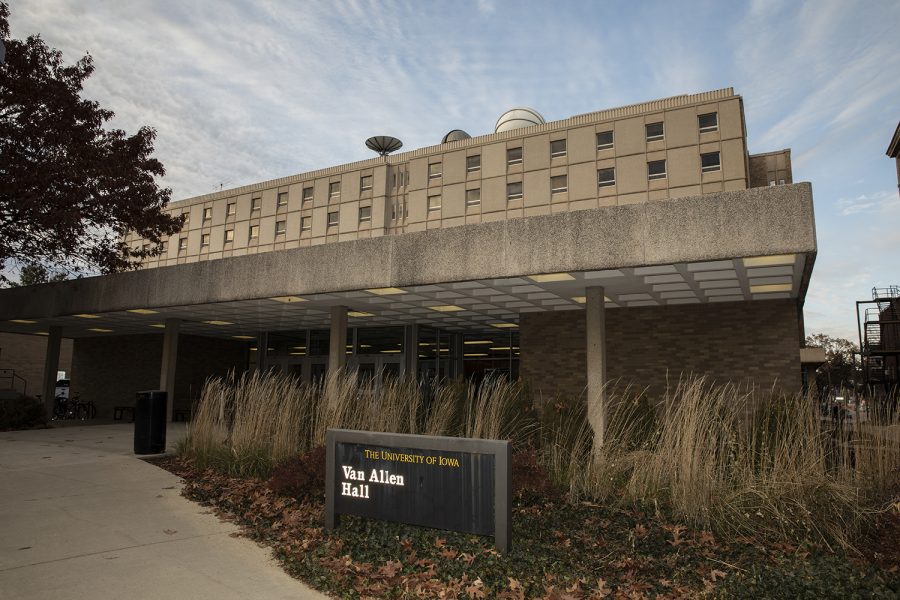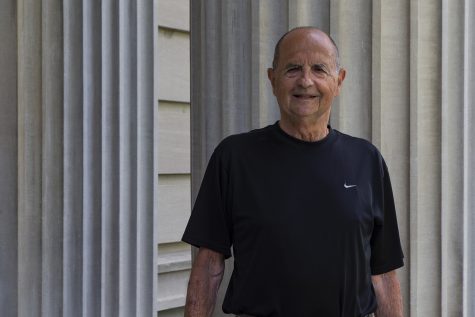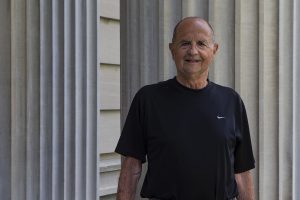UI professors mapping the way for the future of plasma physics and fusion energy research
Professor Scott Baalrud is the co-chair of a committee setting a 10 year plan for the future of plasma physics and fusion energy research.
Van Allen Hall is seen on Monday, November 18, 2019. Van Allen is the home of the physics and astronomy department.
June 21, 2020
University of Iowa professors are taking the lead on plasma physics and fusion-energy research. A campus committee has created a strategic plan to advise the Office of Fusion Energy Science with the U.S. Department of Energy on how to invest its resources to advance research.
Fusion energy is a type of energy created by fusing together light elements like hydrogen. This is a similar process seen in the sun and stars, according to Fred Skiff, physics and astronomy professor at the UI.
UI Physics and Astronomy professor Scott Baalrud co-chairs the committee that developed a 10-year plan for the future of plasma physics and fusion-energy research.
“It also describes what the scientific community feels are the highest priority, basic science questions in plasma science and engineering,” Baalrud said.
Baalrud said his committee is prioritizing research on fusion energy because it has the potential to provide a carbon-free source of energy for the world. Fuel for fusion energy is abundant, he said, because the main component is isotopes of hydrogen found in seawater.
Skiff is a member of a committee of experts that will review Baalrud’s report before sending it to the U.S. Department of Energy. This report is important because it is going to inform the department on how it does its work, he said.
“[Baalrud’s committee] is trying to shepherd and lead the scientific community doing this research,” Skiff said. “They provide funding from the government and they want to make sure their money is well spent.”
Skiff said fusion energy is a better alternative to other types like fission energy — which can be used to make nuclear bombs.
“Sea water isn’t dangerous,” Skiff said. “It’s not like uranium where people also make weapons out of it.”
Skiff said fission energy leaves behind radioactive waste that lasts for 100,000 years and causes harm to the environment. Fission energy is a kind of nuclear energy that power plants use.
The shift to fusion energy, however, is not simple, he said.
“To do fusion, you have to heat the hydrogen to temperatures like there is in the sun, which is 10 million degrees,” Skiff said. “That’s not easy.”
Fusion energy has been researched for 50 to 60 years, Skiff said. Although there has been a lot of progress, he said, people have become skeptical about fusion energy because it is taking so long.
The UI report sets a goal to build a demonstration fusion power plant in the 2040s, Baalrud said.
“It’s a very hard problem, but when a lot of smart people work on a problem for a long time, you make progress,” Skiff said.
Gregory Howes is another UI Physics and Astronomy professor involved in plasma physics research. Howes was a part of the community planning process that established priorities for Baalrud’s committee to consider.
Howes said that setting priorities for plasma-physics research is crucial to make sure members of the community are using their resources toward common goals.
“Otherwise, all of these different little areas are fighting for their slice of the pie,” Howes said.
The average person may not realize the wide applicability of plasma physics, he added. The most obvious application is computer technology, he said.
“Every chip from your phone to your computer uses what is called plasma processing,” Howes said.
Howes said that a new and cutting-edge plasma technology is being used for medicine, including cancer treatments.
The importance of plasma physics research is to provide information for future generations, Skiff said.
“It’s really not about my career,” Skiff said. “It’s about the next generation of people coming along.”



















